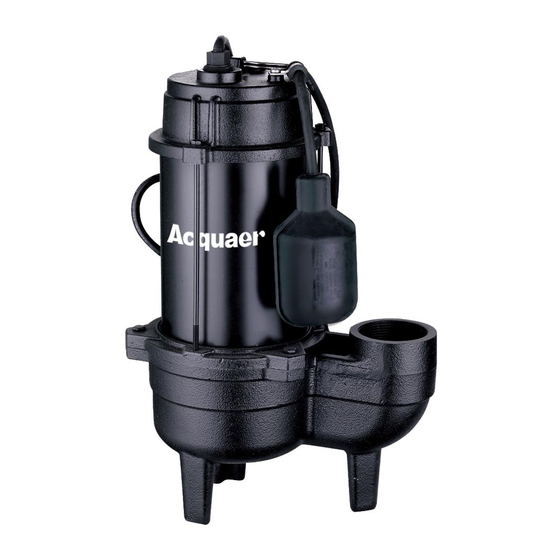Acquaer SEC075T-1 Panduan Pemilik - Halaman 3
Jelajahi secara online atau unduh pdf Panduan Pemilik untuk Pompa Air Acquaer SEC075T-1. Acquaer SEC075T-1 15 halaman. Submersible sewage pump
Juga untuk Acquaer SEC075T-1: Panduan Pemilik (9 halaman)

WARNING
Do not pump flammable or explosive liquids such as oil, gasoline, kerosene, ethanol, etc. Do not
use in the presence of flammable or explosive vapors. Using this pump with or near flammable
liquids can cause explosion or fire, resulting in serious personal injury and/or property damage.
Always disconnect the pump from its power source before installing, inspecting, maintaining, or repairing.
Do not stand in water when the pump is connected.
Do not touch the pump housing while it is operating, as the pump may be HOT and can cause serious
skin burns.
Do not disassemble the motor housing. The motor has NO repairable internal parts, and disassembling
may cause oil leakage or dangerous electrical wiring issues.
CAUTION
This pump was designed exclusively for SEWAGE WATER TRANSFER applications, i.e. transferring
water with 2 in. suspended, stringy solids in it, and NOT to pump clear water from sump pits, hot water
applications, water fountain/features applications, etc.
Call an electrician when in doubt. The pump should be connected to a separate 15 A circuit breaker or
15 A fuse block. Plugging into existing outlets may cause low voltage at the motor. This could cause
blown fuses, tripping of motor overload or a burned out motor.
This pump is made of high-strength, corrosion-resistant materials. It will provide trouble-free service for
a long time when properly installed, maintained, and used. However, inadequate electrical power to the
pump, dirt, or blockage by ice or debris may cause the pump to fail, eventually bringing about additional
water damage. To minimize the potential for water damage due to pump failure, please carefully read
the manual and follow the instructions regarding common pump problems and remedies or call
800-210-1360
This pump has not been tested or approved for use in swimming pools or in salt-water marine areas.
It is also not engineered to be run continuously as a "fountain" or "waterfall" pump. Because this
pump has an oil-filled motor, it should NOT be used in water containing fish. Pump only water with
this pump.
For safety, the pump motor has an automatic resetting thermal protector that automatically will turn off
the pump if it becomes too hot. Overuse of this feature will damage the pump and will void the
warranty.
Once the thermal protector detects that the pump has cooled to a safe temperature, it will allow the pump
to operate normally. If the pump is plugged in, it may restart unexpectedly.
Know the pump applications, limitations, and potential hazards.
1.
2.
Make certain the electrical power source is adequate for the requirements of the pump.
ALWAYS disconnect the power to the pump before servicing.
3.
Release all pressure (drain all water) within system before servicing any component.
4.
Secure discharge line before starting pump. An unsecured discharge line will whip, possibly causing
5.
personal injury and/or property damage.
Secure the pump on a solid base to keep the pump vertical and above mud and sand during operation
6.
7.
to maximize pumping efficiency and prevent clogging and premature pump failure.
Check that all pipe connections are tight to minimize leaks.
8.
Connect the pump DIRECTLY to a grounded, GFCI outlet.
Extension cords may not deliver sufficient voltage to the pump motor. Extension cords present a life
9.
threatening safety hazard if the insulation becomes damaged or the connection ends fall into water.
Make certain the electrical circuit to the pump is protected by a 15 Amp or larger fuse or circuit breaker.
10.
Periodically inspect the pump and system components to be sure the pump inlets are free of mud, sand,
11.
and debris. DISCONNECT THE PUMP FROM THE POWER SUPPLY BEFORE INSPECTING.
Wear safety glasses at all times when working with pumps.
12.
Follow all electrical and safety codes, particularly the National Electrical Code (NEC) and in the
13.
workplace, the Occupational Safety and Health Act (OSHA).
SAFETY INFORMATION
SAFETY INFORMATION
